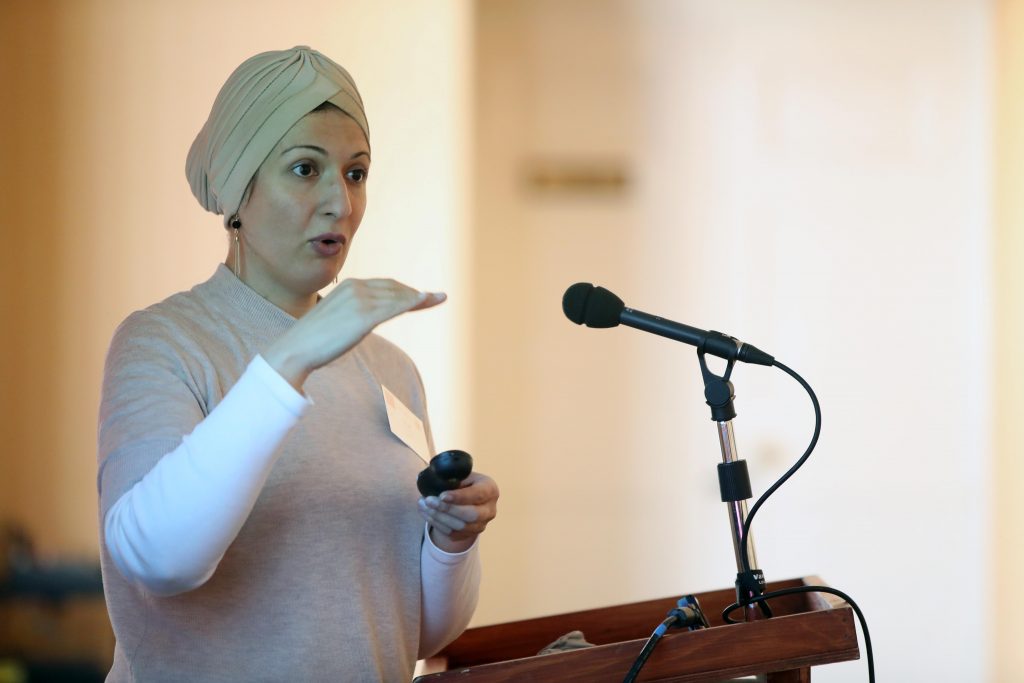MS and the PhD
28 May 2019Today is World MS Day – a day which aims to raise awareness of multiple sclerosis and bring together those who are living with the condition to share their stories.
MS is a neurological condition that affects the brain, optic nerves and spinal cord causing a range of symptoms such as problems with balance, vision and muscle control. The cause of MS is currently unknown, and at the moment there is no cure. However, research is progressing quickly in the hope of finding one.
Here, Eman Al-Wattar, School of Chemistry, shares her story of living with MS while studying for her PhD.

It’s not easy to summarise the mental and physical issues that MS creates, many of which are invisible. Issues with sleep and anxiety are amongst the symptoms. This is uncomfortable and stressful for all those with MS, but particularly for PhD students (who are often already stressed and tired!) Like the moon has two faces – light and dark – people with MS face two extremes. Some days you just feel normal, healthy and even bright and shiny! While some other days are extremely difficult, and leave you feeling tired and depressed. Numbness and muscle pain are amongst the most common symptoms, but forgetfulness and physical fatigue also play a role.
A new way of life
The general medications for my MS act on the nervous system and include Avonex – a weekly pen injection. The injections are painful and make me sick for at least two days. I become shuddery, with cold-like symptoms and acute headaches.
Monthly tests, physical therapy and psychological care are all part of my normal routine, and I feel I have started to adapt to this way of life. Still, maintaining positive energy and a happy mood is a big challenge, especially being alone in another country away from my family.
Remaining positive is not always easy for an MS patient, but it is important because it helps us to move on and continue with our lives. Sympathy and support from others is so precious – it has really helped with my self-esteem and helped me to remain optimistic.
Relationships can sometimes suffer due to the emotional and physical problems that MS causes. Therefore, people with MS need understanding friends and loving partners as well as psychological care.

Challenges for a PhD student
Throughout my studies, one of the big difficulties has been trying to maintain my focus. Remembering to save my materials has also been a challenge!
After completing my first year, my health was particularly bad and I started using a walking stick. I found that everyone at the University was very sympathetic, supportive and helpful. The Health and Safety and Security teams ensured that I was safe and obstacle-free while working in the lab.
My advice to any PhD students who are dealing with illness whilst studying is as follows. Make sure you tell your Head of School and the School’s administrative staff about your situation – they will be able to do a health and safety assessment and make any adjustments you need. Try to be optimistic. You will have difficult days but try to put aside your illness as much as you can, in order to continue with your life.
Find out more about multiple sclerosis on the MS Society’s website.
Comments
2 comments
Comments are closed.
- June 2024
- March 2024
- February 2024
- November 2023
- September 2023
- June 2023
- May 2023
- January 2023
- December 2022
- November 2022
- October 2022
- September 2022
- July 2022
- May 2022
- April 2022
- January 2022
- December 2021
- November 2021
- August 2021
- July 2021
- June 2021
- February 2021
- January 2021
- November 2020
- October 2020
- September 2020
- August 2020
- July 2020
- June 2020
- April 2020
- March 2020
- February 2020
- January 2020
- December 2019
- November 2019
- October 2019
- September 2019
- August 2019
- July 2019
- June 2019
- May 2019
- April 2019
- March 2019
- February 2019
- January 2019
- December 2018
- November 2018
- October 2018
- September 2018
- August 2018
- July 2018
- June 2018
- May 2018
- April 2018
- March 2018
- February 2018
- Biosciences
- Careers
- Conferences
- Development
- Doctoral Academy Champions
- Doctoral Academy team
- Events
- Facilities
- Funding
- Humanities
- Internships
- Introduction
- Mental Health
- PGR Journeys
- Politics
- Public Engagement
- Research
- Sciences
- Social Sciences
- Staff
- STEM
- Success Stories
- Top tips
- Training
- Uncategorized
- Wellbeing
- Working from home
This is so inspiring! Congratulations!
Dr. Eman Al-Wattar
She is awesome and amazing .
You will have difficult days but try to put aside your illness as much as you can, in order to continue with your life.
Mazen Mahfouz